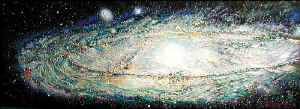
KARMA
Even
within Asia, where the concept of karma has a long history and has been incorporated
into a wide range of cultures, karma is often misunderstood. Viewed from a negative,
backward-looking perspective, some have used the theory of karma to encourage
the disadvantaged members of society to passively accept their situation in life:
one's present suffering is attributed to negative causes one made in the past.
Considering themselves to blame for their situation, those who accept this concept
have fallen prey to a sense of powerlessness.
This perspective is, however,
a distortion of the original meaning of karma as it is used in the Buddhist tradition.
To accept the idea of karma does not mean to live under a cloud of resignation
and guilt, without knowing what negative causes we may have made in the past.
Rather, the true meaning of karma is to be confident that our destiny is in our
own hands and that we have the power to transform it for the better at any moment.
In simplest terms, karma, which means actions, indicates a universal principle
of causation, similar to that upheld by modern science. Science assures us that
everything in the universe exists within the framework of cause and effect. "For
every action, there is an equal and opposite reaction," is a familiar principle.
The difference between the materialistic causality of science and the Buddhist
principle of karma is that the latter is not limited to only those things that
can be seen or measured. Rather, it includes the unseen or spiritual aspects of
life, such as the sensation or experience of happiness or misery, kindness or
cruelty. In an address delivered in 1993, SGI President Ikeda described these
different approaches. The Buddhist concept of causal relations, he wrote:
.
. . differs fundamentally from the kind of mechanistic causation which, according
to modern science, holds sway over the objective natural world--a world divorced
from subjective human concerns. Causation, in the Buddhist view, spans a more
broadly defined nature, one that embraces human existence. To illustrate, let
us assume that an accident or disaster has occurred. A mechanistic theory of causation
can be used to pursue and identify how the accident occurred, but is silent regarding
the question of why certain individuals should find themselves caught up in the
tragic event. Indeed, the mechanistic view of nature requires the deliberate forestalling
of such existential questionings.
In contrast, the Buddhist understanding
of causation seeks to directly address these poignant "whys?"
Originally,
the Sanskrit word karma meant work or office, and was related to verbs that mean
simply "do" or "make." According to Buddhism, we create karma
on three levels: through thoughts, words and actions. Acts of course have a greater
impact than mere words. Likewise, when we verbalize our ideas, this creates more
karma than merely thinking them. However, since both words and deeds originate
in thoughts, the contents of our hearts--our thoughts--are also of crucial importance.
Karma can be thought of as our core personality, the profound tendencies that
have been impressed into the deepest levels of our lives. The deepest cycles of
cause and effect extend beyond the present existence; they shape the manner in
which we start this life--our particular circumstances from the moment of birth--and
will continue beyond our deaths. The purpose of Buddhist practice is to transform
our basic life tendency in order to realize our total human potential in this
lifetime and beyond. (See related article, "The Eternity of Life," for
a discussion of the continuity of karma.)
The important thing to recognize,
however, is that cause and effect both exist simultaneously within us in the present
moment. As one of the ancient Buddhist texts states: "If you want to understand
the causes that existed in the past, look at the results as they are manifested
in the present. And if you want to understand what results will be manifested
in the future, look at the causes that exist in the present."
Karma is
thus, like everything, in constant flux. We create our own present and future
by the choices we make each moment. In this light, the teaching of karma does
not encourage resignation, but empowers us to become the protagonists in the unfolding
drama of our lives.
Adapted from an article in the January 1999 issue of the
SGI Quarterly with permission from Soka Gakkai International Office of Public
Relations.